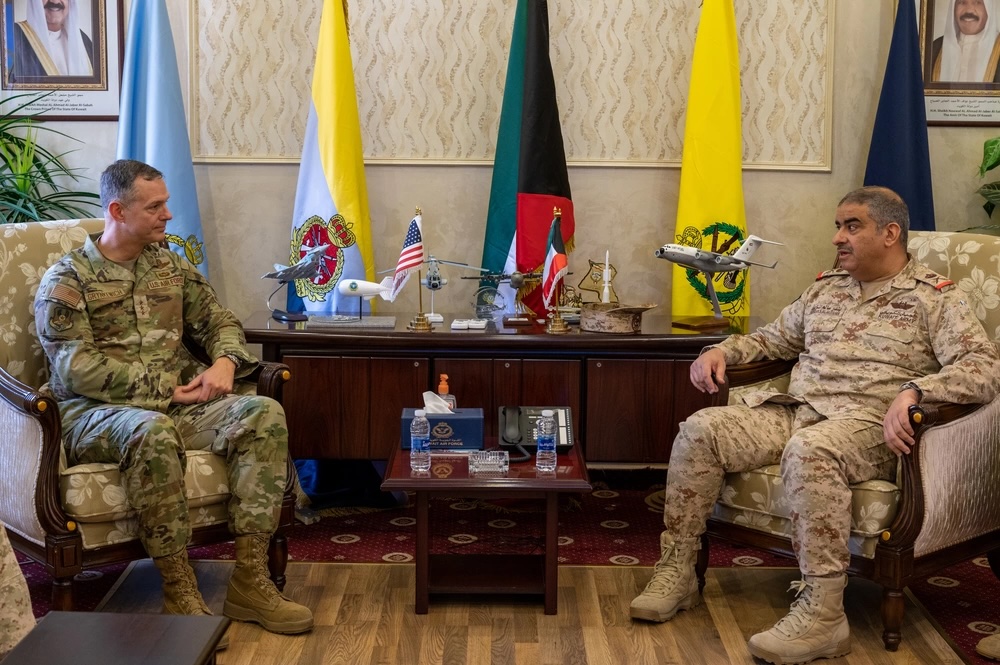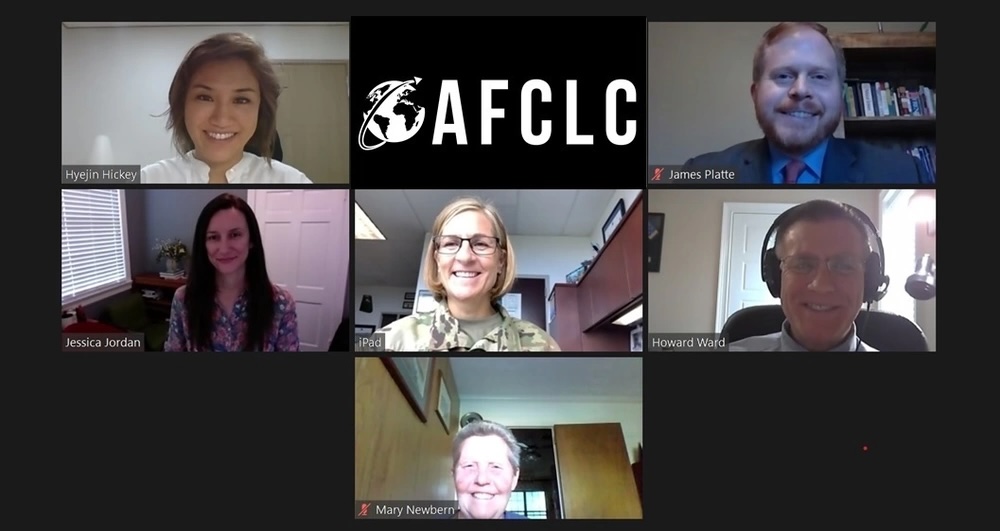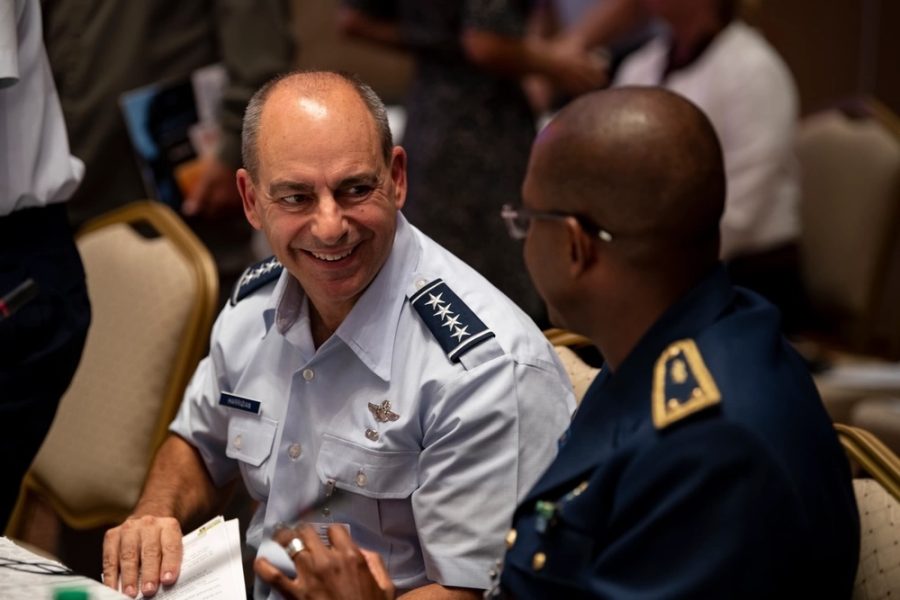It was July 2023, and Brig. Gen. Paul Moga had a lot on his plate. The one-star had just moved to Ramstein Air Base, Germany, for his new role as chief of staff at Headquarters U.S. Air Forces Europe and Air Forces Africa, a command that oversees 104 countries, a vast range of cultures, and a complicated history stretching back centuries.
As a general officer, Moga had to be ready to discuss sensitive security issues with key military and civic leaders—meetings where a faux pas or a lack of historical context could delay progress or upset partners.
“It’s helpful to know, when you’re in a room with 18 air chiefs from across Africa, which ones may be more inclined to work with one another just based on history,” the general told Air & Space Forces Magazine. “If you have that knowledge in the back of your brain, you can be more observant and be more focused on how you choose to have bilateral or multilateral conversations with either current or emerging partners.”
Moga had served on the staff of U.S. European Command before, but Africa would be a new experience for him, and there was not much time to prepare. Luckily, the Air Force has a unique program for readying general officers so they can engage foreign dignitaries with minimal turbulence. The General Officer Pre-assignment Acculturation Course (GOPAC), run by Air University’s Air Force Culture and Language Center, links generals with professors, ambassadors, or other subject matter experts who lead a discussion-style master class on the most important topics their star-shouldered students need to know about their assigned region.
“I read classified briefings all the time and I’m very familiar with how the military communicates and what the military focuses on,” Moga said. “But they brought such a different perspective with regards to historical context, relationships between countries or regions, how it all ties together into the present day, and where they think these regions are headed.”
The discussions were not death-by-PowerPoint or overly academic. Indeed, the subject matter experts tailored the course for Moga after meeting previously with him and his predecessor to determine what were the most important topics for the job. They then divided the two-day long course into several sections and met whenever the general’s schedule permitted.
“What I found with many allies or partner nations is that the little things really do matter,” Moga said. “You might say something that you don’t think means a whole lot, but it could potentially be extraordinarily offensive, so the more context you have on every partner and every ally, the stronger that relationship will be.”

Culture as the Operating System
GOPAC started in 2010, when the counterinsurgency wars in Iraq and Afghanistan showed that the U.S. military needed to better understand its partners and adversaries in the region. Among the first participants were then-Brig. Gen. John Raymond, who later became the first Chief of Space Operations, then-Brig. Gen. David Allvin, who is now the acting Air Force Chief of Staff, and then-Brig. Gen. Tod Wolters, who later became NATO Supreme Allied Commander Europe.
“The success of a lot of those missions depended on the ability to integrate and work with the host nation,” said Howard Ward, the director of AFCLC and a retired Air Force colonel. “Those same principles endure today.”
The original in-person program produced three or four graduates a year focusing on U.S. Central Command. But GOPAC took off during the COVID-19 pandemic, when AFCLC began offering virtual classes.
“We didn’t anticipate how much that would increase our reach,” Ward said. “Now instead of one-star students, we started to pick up two- and even three-stars because we could be more flexible with scheduling.”
The program now covers every combatant command region and has produced 15 graduates so far this year. Historical context is a frequent must-learn, but so are cultural differences about behaviors such as humor, gift-giving, and etiquette.
“We refer to culture here as the operating system of humans,” Ward said. “To understand how that person is going to render decisions and on what kind of timeline, you have to understand how the operating system works.”
Those differences can quickly become apparent in meetings with key leaders. For example, self-deprecating humor is connected with humility in American culture, but other cultures may express humility differently and see such humor as self-defeating. Gift-giving is another example.
“We might say, ‘Oh, it was nothing’ to communicate that there is not an expectation for reciprocity, but if the recipient takes the statement at face-value, they might say, ‘Well gosh, why are you giving me something that’s not worth any value?’” Ward said. “That can have exactly the opposite effect.
“Those types of things transcend the traditional political-military discussions of what the issues are,” he added. “These are the issues behind the people involved in the issues.”

Expanding Horizons
Moga is not the only one praising GOPAC. The head of U.S. Space Force Indo-Pacific Command, Brig. Gen. Anthony Mastalir, said in a statement that the course provided “an a-ha moment in understanding the relationship with the Philippines.”
Brig. Gen. David Mineau, the deputy commander of Air Forces Central, said that most senior leaders are keyed in to the leading issues in their upcoming area of responsibility, but “there are always blind spots,” and GOPAC helped him “pick up nuances from every corner and reflect on the historical, political, and cultural dynamics at play.”
Ward has heard other participants make comments like “I can’t imagine doing the job without this course” and “the first key leader engagement would have been an awkward first date that might not have gotten to a second date.”
Besides general officers, a few colonels, senior enlisted leaders, and spouses moving overseas have also participated. GOPAC is the only program of its kind in the Department of Defense, and one of its graduates is Marine Maj. Gen. Robert Sofge. Not many leaders from other services have expressed interest yet, and GOPAC is reaching max capacity under its current student load, Ward said. Still, program organizers hope to find even better and more efficient ways of doing business during a review this December, which may unlock opportunities for growth.
“The truly strategic value is when our partners and allies see how much time, money, and effort we invest in being able to engage successfully with them,” Ward said.

